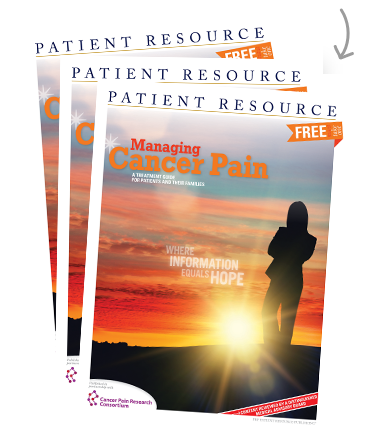Pain
Rehabilitation care
Rehabilitation care is an important part of overall cancer care. Health care professionals work as a team to provide rehabilitation care to help patients improve their physical strength, increase their ability to care for themselves and manage pain and other symptoms (see “cancer rehabilitation team” box below). The team is led by a physiatrist, a doctor who is an expert in nerves, muscles and bones; physiatrists treat injuries and illnesses that affect how you move.
Cancer rehabilitation care is most often given after cancer treatment, but it can also be given before. When it’s given before treatment, the rehabilitation team can help you build strength so that your body is better prepared to handle treatment. This can help reduce the level of pain you experience during or after treatment. Rehabilitation care given before cancer treatment is called “pre-habilitation.”
When given after cancer treatment, the rehabilitation team will teach you exercises that will help your body recover from surgery or improve the function of muscles and tissues damaged by radiation treatment or chemotherapy. These exercises may cause some discomfort in the beginning, but over time, your body will become stronger, and this discomfort will pass. Gaining muscle strength can also help control other cancer-related pain.
The cancer rehabilitation team
The cancer rehabilitation team can include a wide range of health care professionals who work together to help people with cancer cope with changes resulting from cancer and its treatment, with a focus on gaining physical strength and carrying out routine activities. The team members who are most often involved in care that can help reduce pain are the following:
- Physiatrist – a doctor who treats injuries and illnesses that affect how people move.
- Rehabilitation nurse – a nurse who helps people with cancer improve their ability to care for themselves.
- Physical therapist – a health care professional who helps patients do exercises that will improve their physical strength, their ability to move, and their balance. Physical therapists may also use ultrasound methods to help control some types of pain.
- Occupational therapist – a health care professional who helps increase patients' comfort, function and safety while doing activities important to them.
- Psychologist – a doctor who has expertise in the mind and behavior who can help you manage psychological distress related to cancer, including coping with pain.
- Lymphedema therapist – a health care professional who helps manage the discomfort and other symptoms associated with lymphedema (a buildup of fluid in an arm or leg from damage to lymph nodes during cancer treatment).
Goals of rehabilitation
The goal of cancer rehabilitation is to help people with cancer move more easily and with less pain. Rehabilitation care starts with an evaluation of how well you perform specific activities. The team will assess how well you can move and take care of daily activities. The team will also talk with you about what specific goals you have and will develop a plan to help you reach those goals. This plan will be tailored to your specific needs and goals. The team will work with you to make sure that your goals are realistic — if you set too a high a goal, you may become frustrated if you don’t achieve it, which can make you less motivated.
Rehabilitation and pain management
Cancer rehabilitation is focused on restoring function and movement, which will help in managing pain. For example, range-of-motion exercises not only help restore function after mastectomy, but they can help alleviate pain. In addition, physical therapists can help you learn about how applying heat and/or cold can help alleviate pain and they are also skilled in providing treatments such as electrical stimulation, hydrotherapy, traction and massage. (Click here to learn more about the various types of massage.)
Speak up
Despite the importance of cancer rehabilitation, many patients are not referred to this valuable resource. If your doctor does not talk to you about rehabilitation, don’t be afraid to raise the issue. You deserve to have all the options available to help you get through each day with as much comfort as possible.



